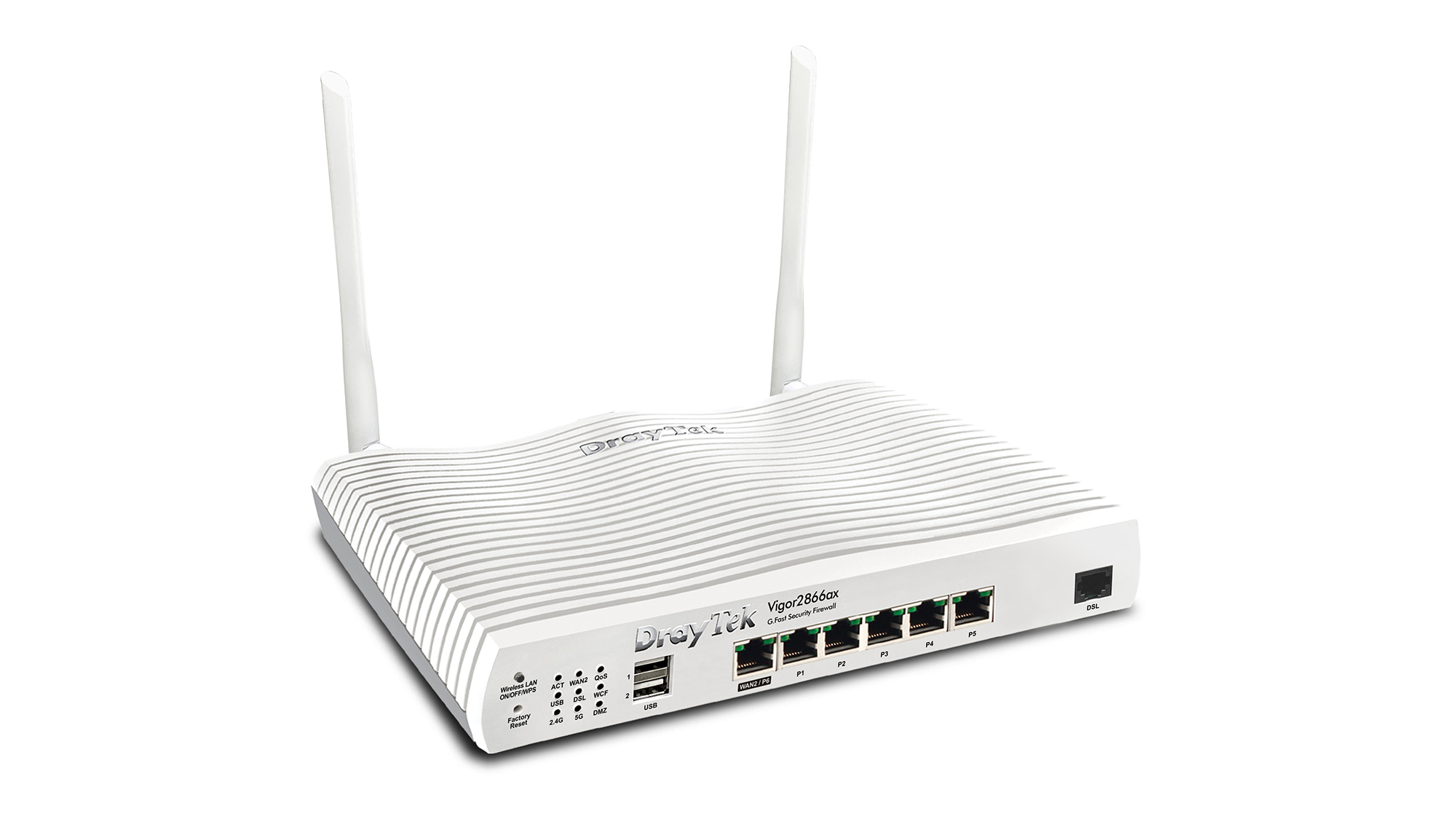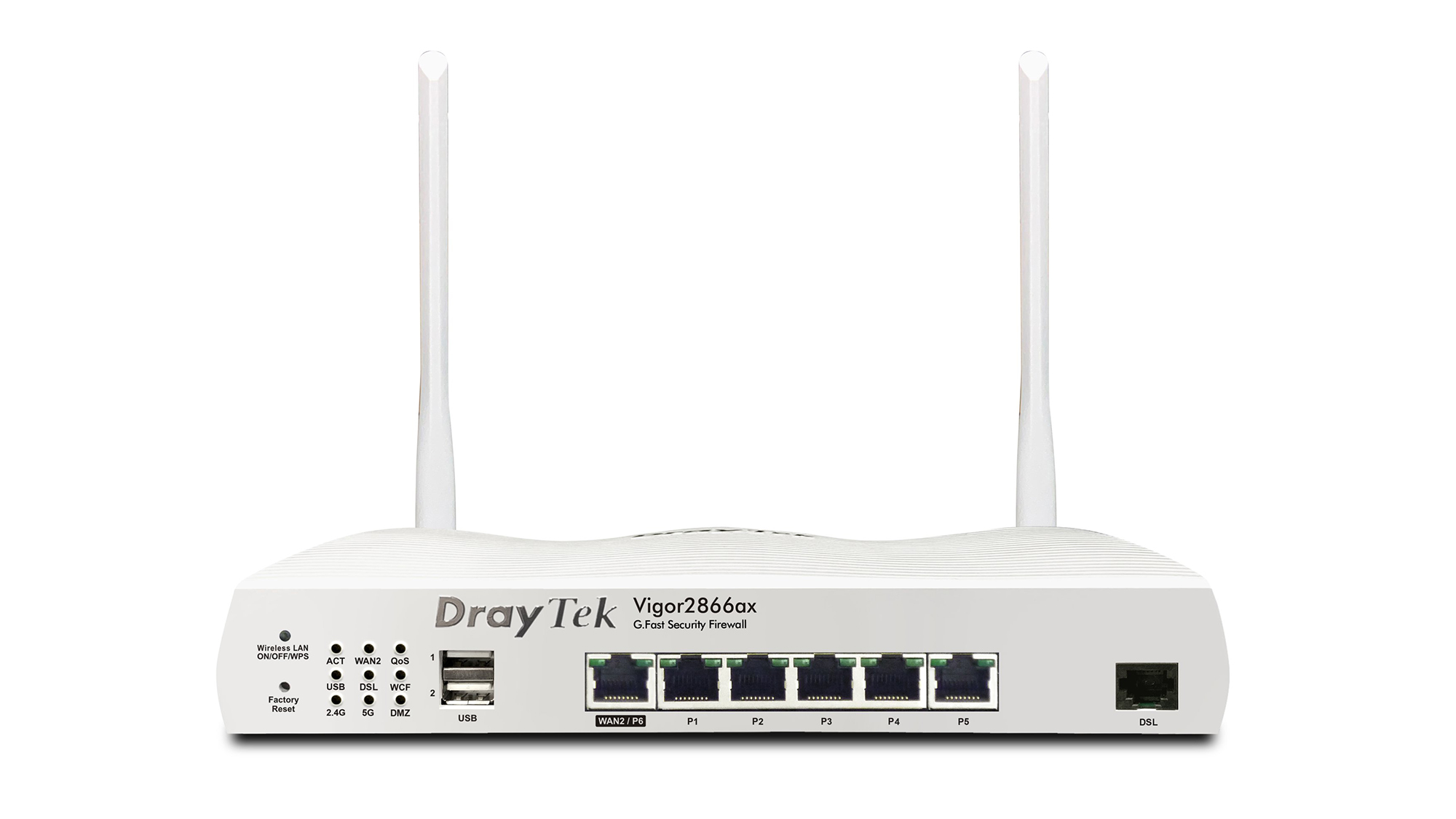DrayTek Vigor 2866ax review: Faster than you might expect
A versatile and very affordable SMB security router with Wi-Fi 6 and top-notch WAN redundancy


-
+
Clever hardware acceleration
-
+
Smooth installation
-
+
Robust security features
-
+
Great value
-
-
No gateway malware protection or anti-spam

DrayTek’s Vigor 2866ax looks like an ordinary wireless router – and for a small office it can fulfil that role perfectly well. It offers a solid set of Wi-Fi 6 services, with speeds of up to 574Mbits/sec on its 2.4GHz radio and 2.4Gbits/sec on the 5GHz band. It’s also one of the very few SMB routers we’ve seen that supports wide 160MHz channels for maximum bandwidth. Round the back, six Gigabit Ethernet ports allow for the direct connection of wired clients, or the sixth can alternatively be configured as a WAN socket, as we’ll discuss below.
Installation is a cinch. The router’s web console provides quick-start wizards for configuring internet access, presenting secure wireless services and setting up VPNs. The price includes support for 32 IPsec tunnels plus 16 SSL VPNs, with optional hardware acceleration for increased performance. The firewall is also enabled out of the box, and preconfigured with a strict security policy; this can be customised with rules and filters, which are also used to enforce application controls and web content filtering. Cloud management is available via the optional VigorACS 3 web portal.
DrayTek’s URL keyword filtering service is basic, but you can beef it up with the optional Cyren GlobalView service, which divides the web up into 81 site categories that can be blocked or allowed using up to eight profiles. A free 30-day trial can be activated from your MyVigor account, after which it costs around £35 per year.
Application controls are also free on registration, and provide a list of 160 apps and protocols that can be controlled. Services including Facebook, WhatsApp and LinkedIn can be instantly blocked using profiles enabled within your firewall rules, although we did notice that Twitter is oddly not covered.
One area where the Vigor 2866ax really stands out is WAN redundancy. Alongside the built-in G.Fast/VDSL2 modem, one of the Ethernet sockets can be set as an internet connection, and the two front-facing USB 2 ports will each take a 3G or 4G modem. Each WAN connection can be configured as an active or backup link, with the latter automatically brought online when the primary link fails or its traffic exceeds specific thresholds. Alternatively, you can set mutiple links as simultaneously active, and enable the load balancing service to distribute traffic across them all.

Wireless services are also good for the price. Up to four SSIDs can be defined on the 2.4GHz and 5GHz bands, each with its own security scheme, and you can present hotspot services for guest users with custom web portals and a range of authentication methods.
Performance is helped along by a clever hardware acceleration option that allows traffic that’s already been through the firewall and content filters to bypass the CPU. This can yield huge performance benefits: with acceleration disabled, close-range file copies between a server (connected via Ethernet) and a Windows workstation connected over Wi-Fi 6 averaged 65MB/sec, with router CPU usage peaking at 80%. Enabling acceleration saw speeds leap up to 105MB/sec, while CPU usage dropped to barely 5%. We were also able to gain a small performance increase by enabling the 160MHz channel width, which saw copy speed increase slightly to 107MB/sec.
The Vigor 2866ax offers a lot for a low price; it’s a great choice for small businesses that want reliable internet and security services in one unit. It lacks some advanced features such as gateway malware protection and anti-spam, but all the essential security measures are present, and thanks to DrayTek’s powerful hardware acceleration it’s faster than you might expect.
DrayTek Vigor 2866ax specifications
| Chassis | Fanless desktop unit |
| Modem | G.Fast/VDSL2 RJ-11 modem |
| Network | 6 x GbE ports (5 x LAN, LAN/WAN), 2.4/5GHz 802.11ax wireless |
| Other ports | 2 x USB 2 |
| Dimensions (WDH) | 241 x 165 x 44mm |
| Weight | 780g |
| Warranty | 2yr RTB warranty |
Get the ITPro daily newsletter
Sign up today and you will receive a free copy of our Future Focus 2025 report - the leading guidance on AI, cybersecurity and other IT challenges as per 700+ senior executives
Dave is an IT consultant and freelance journalist specialising in hands-on reviews of computer networking products covering all market sectors from small businesses to enterprises. Founder of Binary Testing Ltd – the UK’s premier independent network testing laboratory - Dave has over 45 years of experience in the IT industry.
Dave has produced many thousands of in-depth business networking product reviews from his lab which have been reproduced globally. Writing for ITPro and its sister title, PC Pro, he covers all areas of business IT infrastructure, including servers, storage, network security, data protection, cloud, infrastructure and services.
-
 ‘Phishing kits are a force multiplier': Cheap cyber crime kits can be bought on the dark web for less than $25 – and experts warn it’s lowering the barrier of entry for amateur hackers
‘Phishing kits are a force multiplier': Cheap cyber crime kits can be bought on the dark web for less than $25 – and experts warn it’s lowering the barrier of entry for amateur hackersNews Research from NordVPN shows phishing kits are now widely available on the dark web and via messaging apps like Telegram, and are often selling for less than $25.
By Emma Woollacott Published
-
 Redis unveils new tools for developers working on AI applications
Redis unveils new tools for developers working on AI applicationsNews Redis has announced new tools aimed at making it easier for AI developers to build applications and optimize large language model (LLM) outputs.
By Ross Kelly Published
-
 Google layoffs continue with "hundreds" cut from Chrome, Android, and Pixel teams
Google layoffs continue with "hundreds" cut from Chrome, Android, and Pixel teamsNews The tech giant's efficiency drive enters a third year with devices teams the latest target
By Bobby Hellard Published